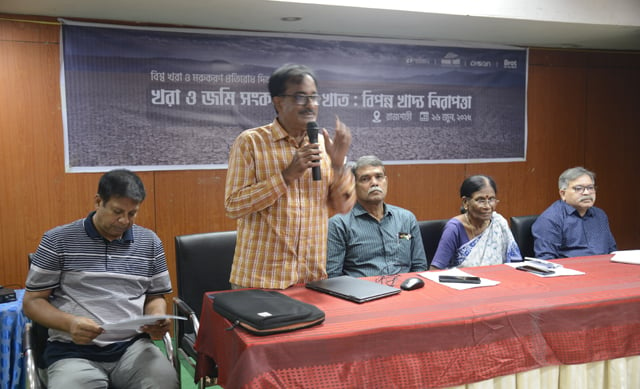
RAJSHAHI, June 27, 2025 (BSS) - Speakers at a participatory meeting unanimously observed that the drought caused by climate change has been posing a serious threat to the agriculture and sustainable water management in Barind.
Adverse impact of climate change has also been affecting the living and livelihood conditions of the marginalized populations in the region badly.
Water experts and development activists came up with the observations while addressing a dialogue titled "Challenges of Agriculture and Water Management in Barind area" here Thursday.
Food Security Network (FSN), a non-government development organization, hosted the dialogue at Hotel Warisan as part of its campaign for food and nutrition to mark the World Day to Combat Desertification and Drought in 2025.
The event aimed to address the impacts of climate change on drought-prone regions, particularly the Barind region and to formulate strategies for mitigation.
Main theme for the day this year is "Restore the land. Unlock the opportunities", which emphasizes the critical role of land restoration in boosting food and water security, supporting climate action, and building economic resilience.
It also highlights the potential of sustainable land use practices to reverse land degradation and create a more sustainable future.
During his keynote presentation, Prof Chowdhury Sarwar Jahan of the Department of Geology and Mining at Rajshahi University noted that the Barind region is among the worst-hit by droughts, with the number of consecutive dry days and temperature steadily increasing over the past 30 years.
Drought episodes have become more erratic due to climate change-a trend likely to worsen in the coming decades.
Prof Chowdhury said droughts create severe challenges for vulnerable communities.
During dry spells, most natural surface water sources evaporate, leaving no water for drinking, sanitation or agriculture.
Overall, the human cost includes higher disease incidence-especially among children-malnutrition from crop failure, increased poverty and stunted development.
The Barind's average annual rainfall of 1,400 mm is far below the national average of 2,300 mm. Rainwater does not easily seep into aquifers due to clay soils with low porosity, leading to high evaporation.
Moreover, there are no large or deep surface water sources-like lakes or rivers-so groundwater recharge is very slow.
During droughts, people traditionally use hand-pumped tube wells, which draw from shallow aquifers dependent on seasonal rainfall. However, under current drought regimes, these aquifers dry up, rendering tube wells ineffective.
Prof Sarwar Chowdhury, however, said implementation and promotion of climate-resilient agriculture planning, planned water resource management, crop diversification and compost, bio-fertilizer and bio-pesticides can be the crucial means of mitigating the drought situation.
Senior Journalist Mustafizur Rahman Khan, development activists Afzal Hossain, Rashed Ibne Obayed, Alima Khatun, Shahidul Alam, Rajkumar Shaon and Bimal Chandra Rajwar also spoke on the occasion.